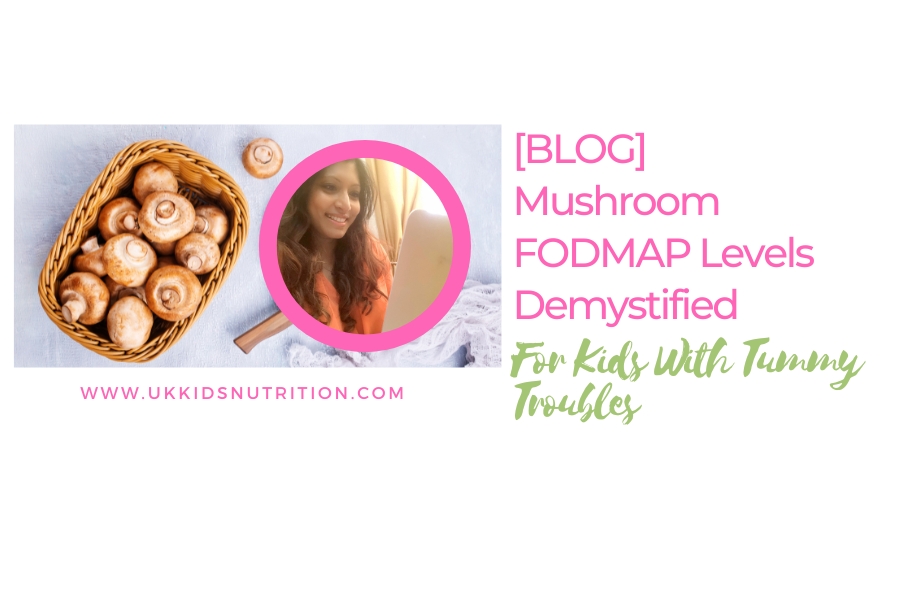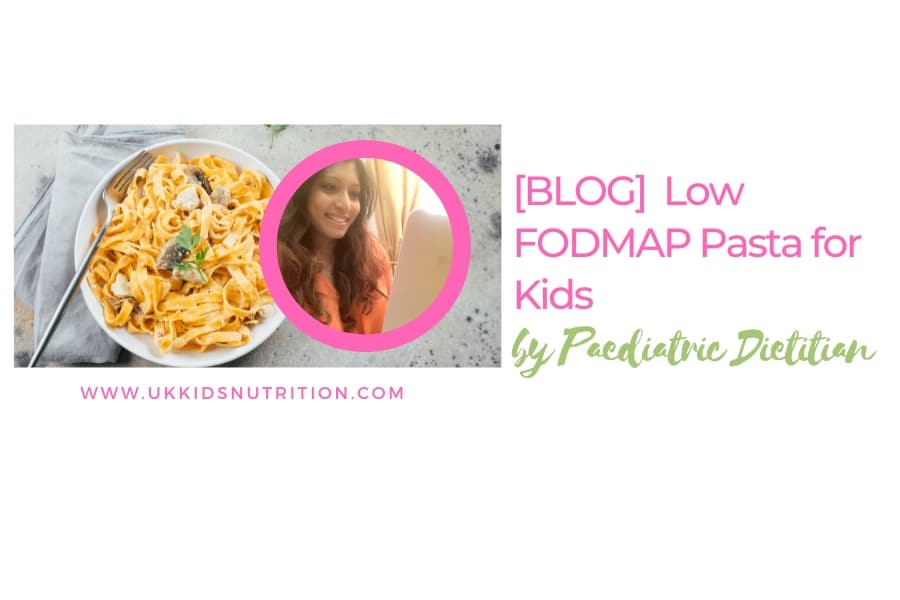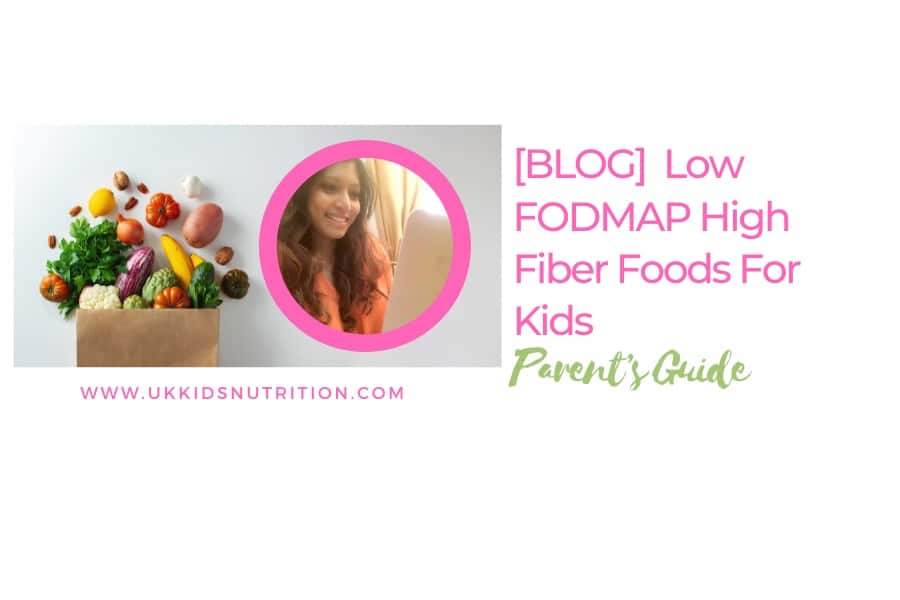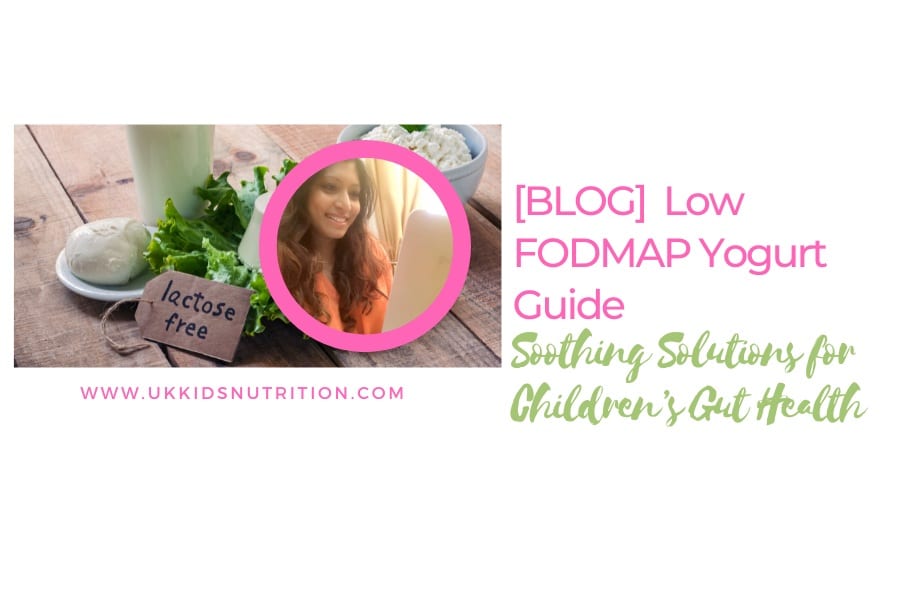In this comprehensive guide, we unravel the intricate world of mushroom FODMAP levels and irritable bowel syndrome.
If your child’s dislike for mushrooms accompanies complaints of belly discomfort, it might not just be picky eating—it could signal their sensitivity to FODMAPs.
Join us in uncovering how mushrooms’ FODMAP status impacts your child’s delicate belly and gut health.
What is a FODMAP?
FODMAPs are short for Fermentable Oligosaccharides, Disaccharides, Monosaccharides and Polyols.
They are poorly digested in the small intestine.
In some adults and children with IBS, FODMAPS, found in foods like mushrooms, can trigger digestive discomfort.
Understanding these FODMAPs and their presence in mushrooms helps create a diet suitable for children with specific sensitivities.
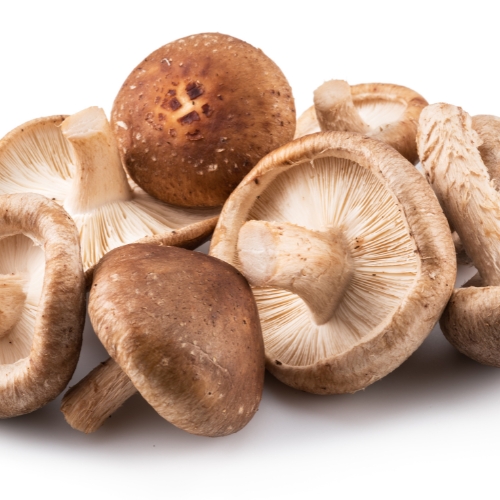
What are mushrooms?
Mushrooms encompass a variety of fungi consumed as a vegetable.
They’re known for their versatility in cooking and carry a distinct characteristic in the form of polyols, a subgroup of FODMAPs.
Depending on the amount called for in fodmap recipes, certain mushrooms can exhibit varying levels of FODMAP content.
Some types of mushrooms are suitable for children with tummy troubles whilst others are too high in FODMAP and might trigger digestive problems.
Are Mushrooms FODMAP Friendly?
Mushrooms and FODMAPs go hand in hand, with mushrooms showcasing varying FODMAP content.
This prompts the common question, ‘Are mushrooms low FODMAP?’.
Some, like oyster mushrooms, are considered low FODMAP, while, others like shiitake mushrooms, may contain higher FODMAP levels.
Let’s explore the specific FODMAPs present in various mushroom types and their impact on sensitive tummies.

Understanding Mushroom FODMAP Composition
Mushrooms frequently contain mannitol, a type of polyol.
Surprisingly, they can also display high fructan content.
For a detailed breakdown of mushroom FODMAP ratings, refer to the table below based on Monash University’s extensive research.
Table of Mushrooms FODMAP Score (According to Monash University)
| Mushroom Type | FODMAP Level |
| Raw Shiitake Mushrooms | Low |
| Dried Shiitake Mushrooms | Low to High |
| Canned Champignon Mushrooms | Low |
| Dried Porcini Mushrooms | Low* |
| Oyster Mushrooms | Low |
| Raw White Button Mushrooms | Moderate to High |
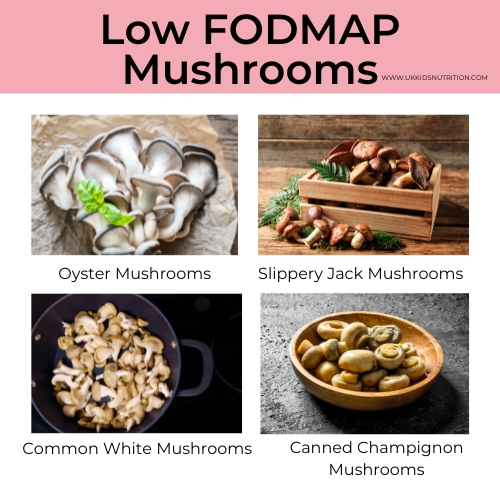
Low FODMAP Mushrooms
Dried Shiitake Mushrooms FODMAP content
At a serving size of 2 mushrooms, dried shiitake mushrooms offer a low FODMAP option, infusing rich umami flavour into diverse recipes.
This versatility makes them ideal for children navigating sensitive stomachs or experiencing changes in their usual stool pattern.
If you are not familiar with normal stool type in children, see: Kid Poop Chart & IBS Explained.
Canned Champignon Mushrooms FODMAP content
Canned champignon mushrooms also fall under the low FODMAP category.
These convenient options can be easily incorporated into winter-warming dishes, providing a mild and earthy taste.
This is because the canning process generally reduces the FODMAP levels in food.
Raw White Button Mushroom FODMAP content
Classified as the ‘common mushroom,’ raw white button mushrooms are grouped in the moderate FODMAP category due to their specific composition.
If your child enjoys these mushrooms without experiencing any discomfort, there’s no need to avoid them.
However, if they start complaining about belly aches or notice changes in their stool consistency, it might be worth considering a switch to a different mushroom variety.
Slippery Jack Mushroom FODMAP content
The good news is that these mushrooms are low in FODMAPs at a serving size of 40g.
As younger children will be satisfied with a smaller portion size of vegetables, you can include slippery jack mushrooms in a stiry-fry or risotto.
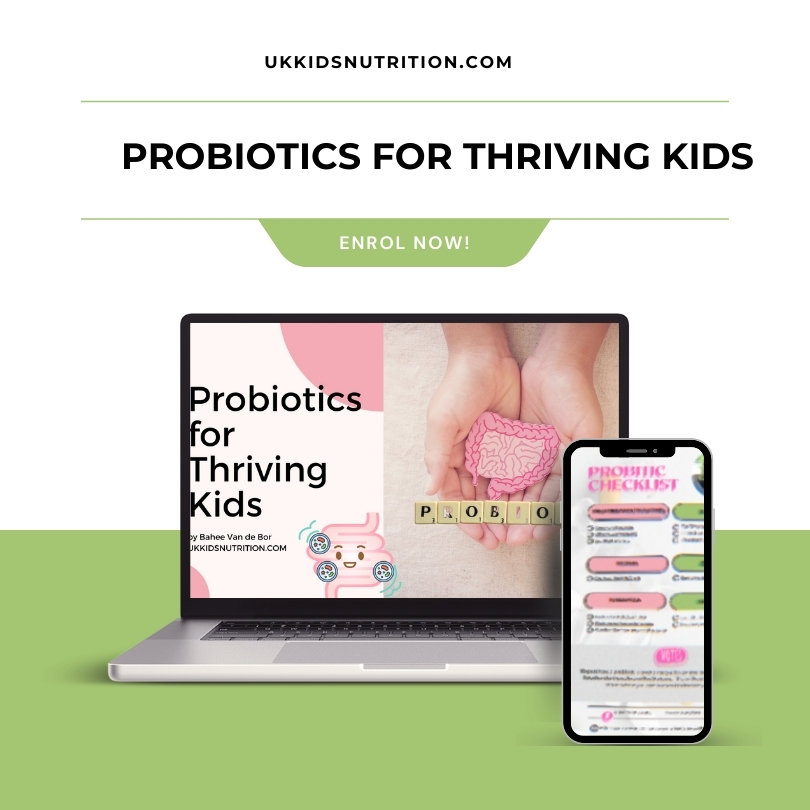
Other Low FODMAP Mushrooms to Enjoy
Oyster mushrooms
Finally, Oyster mushrooms are low FODMAP making them a contender for the title of the best mushroom for IBS.
They are incredibly versatile and perfect in stir-fry dishes or risotto for children.
Their mild taste and adaptability also make them a favourite among many children.
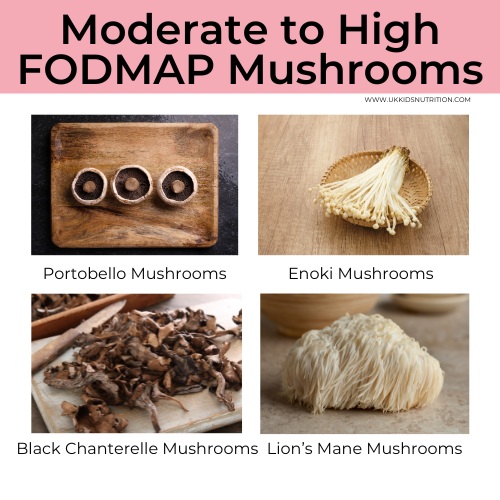
High FODMAP Mushrooms
Dried Porcini Mushrooms FODMAP content
Dried porcini mushrooms, on the flip side, tend to have higher FODMAPs levels.
They contain polyols like mannitol and are a high FODMAP mushroom to avoid.
For children sensitive to FODMAPs, especially mannitol, it’s advisable to use these mushrooms sparingly or consider avoiding them altogether.
While considering suitable mushroom options, it’s essential to understand the implications of a low FODMAP diet for children with IBS.
Are Portobello Mushrooms Low FODMAP?
Unfortunately, for an older child, portobello mushrooms are moderately high in FODMAPs.
If your child only eats ¼ of a mushroom, then it can be classified as a low FODMAP serving size.
Enoki Mushrooms FODMAP content
Enoki mushrooms contain polyols and are therefore not a low FODMAP vegetable.
If your child is not sensitive to polyols, then these are great in stir-fry or risotto.
They have a subtle crunch and a chewy texture but have also been described as nutty.
Black Chanterelle Mushroom FODMAP content
Black Chanterells are edible mushrooms that are also high in FODMAPs.
It’s also known as the black chanterelle, black trumpet, trompette de la mort (French) or trumpet of the dead, djondjon.
It’s best to limit these if you know that your child is sensitive to the sorbitol in some fruits and vegetables.
Lion’s Mane Mushroom FODMAP content
This type of mushroom is moderately high in FODMAPs with two different types of FODMAPs.

Health Benefits of Mushrooms
Considering the variable FODMAP content in mushrooms, you might question whether they’re beneficial for your child’s diet.
Despite this variability, mushrooms boast exceptional nutritional value.
Surprisingly, they rank just after Brazil nuts as one of the richest sources of selenium, an essential brain food for kids.
Selenium plays a crucial role in supporting various central nervous system functions, aiding cognition, and enhancing memory.
Additionally, mushrooms serve as a commendable source of dietary fibre and plant-based protein, making them an excellent inclusion for children following a plant-based diet.
These nutritional attributes highlight the potential benefits of incorporating mushrooms into your child’s meals.
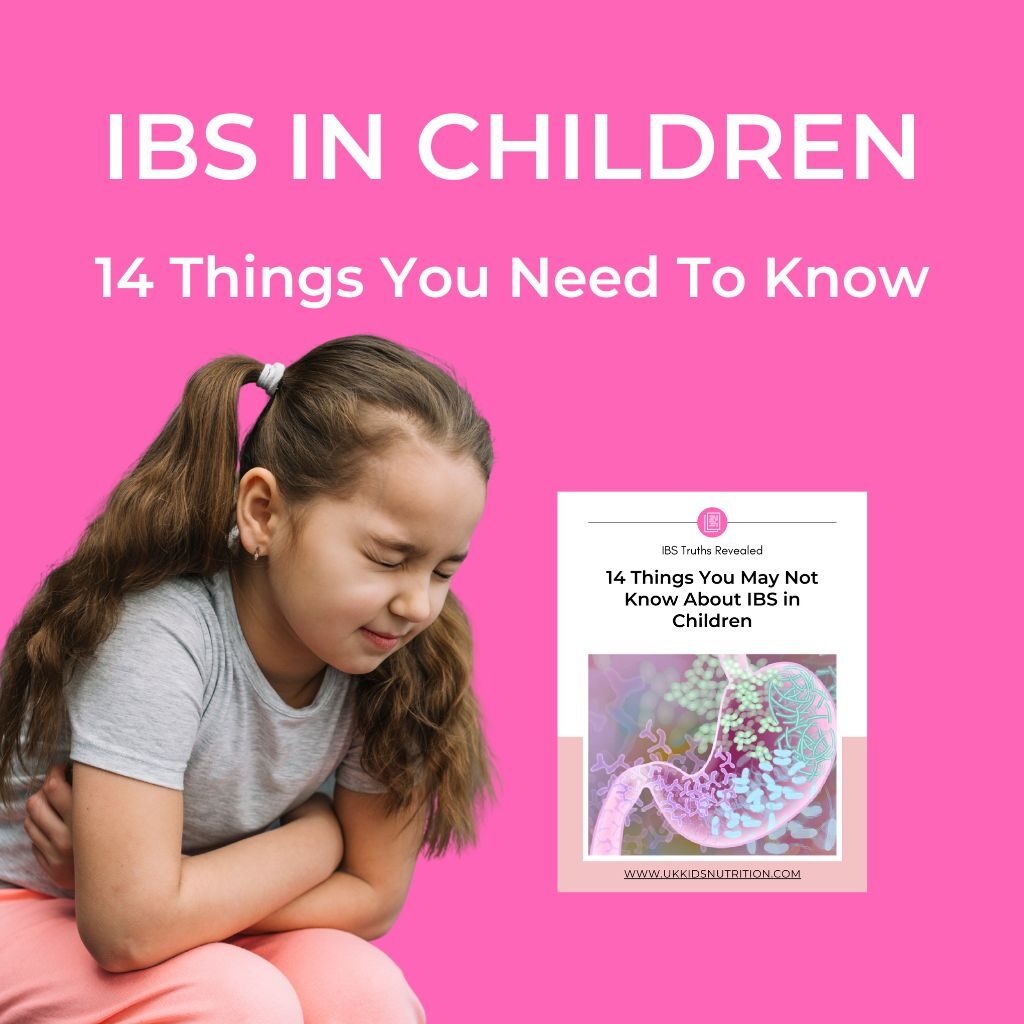
Using the Low FODMAP Diet for IBS in Children
If your child grapples with IBS, adopting the low FODMAP diet can be a game-changer in identifying their specific food triggers.
Unfortunately, the conventional elimination phase of this diet will pose challenges for children. It can potentially result in a significant calorie deficit.
This restricted diet can also lead to a notable reduction in essential micronutrients such as iron, zinc, folate and B vitamins in children.
To address this, it’s crucial to opt for a modified, child-friendly version of the diet under the guidance of an IBS-trained paediatric dietitian.
This tailored approach involves selectively avoiding certain high FODMAP foods, slowly reintroducing them, and pinpointing the culprits behind digestive discomfort.
For comprehensive insights into the children’s version of the low FODMAP diet, explore more in my Happy Belly Club.
Incorporating Fibre into a Low FODMAP Diet
Eliminating all high FODMAP foods might reduce essential gut-friendly fibre in your child’s diet.
This is something that is often overlooked by many parents while implementing a low FODMAP diet.
Instead, explore low FODMAP sources of dietary fibre from fruits and vegetables.
Consulting an IBS-trained pediatric dietitian ensures a modified, child-friendly diet that doesn’t compromise your child’s growth and development.
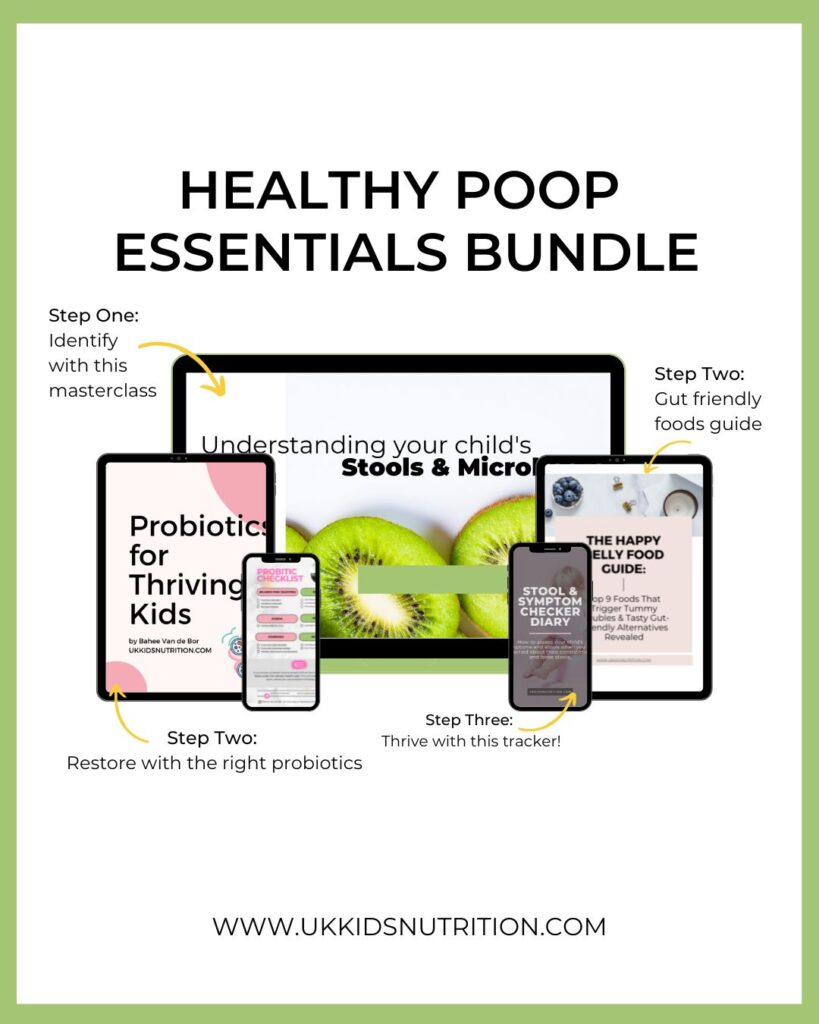
Bottomline
Understanding mushroom FODMAP levels is vital for kids with digestive problems like IBS.
While some mushrooms are low FODMAP, others may trigger discomfort due to varying FODMAP content.
Working with a specialised dietitian ensures tailored guidance for your child’s dietary needs, assisting in navigating which mushrooms suit their sensitive tummies.
Similar to peas’ varied FODMAP content, moderation matters.
Seek support, like my IBS Kids Mastery Method, to pinpoint your child’s triggers and improve their well-being.

Frequently Asked Questions
Can you recommend some mushroom FODMAP recipes for kids with IBS?
Absolutely! Many child-friendly recipes incorporate low FODMAP mushrooms. Think of simple stir-fries with oyster mushrooms or risottos with canned champignon mushrooms. For more recipe ideas, explore our Happy Belly Club.
What is the FODMAP level of white mushrooms?
White mushrooms, specifically raw white button mushrooms, fall into the moderate FODMAP category. This means they can be included in small quantities depending on your child’s tolerance level.
Which mushrooms are considered the best for IBS?
The best mushrooms for IBS are those with low FODMAP levels. Oyster mushrooms and canned champignon mushrooms are good options, as they are typically well-tolerated by children with IBS.
Are oyster mushrooms low in FODMAPs?
Yes, oyster mushrooms are considered low in FODMAPs, making them a suitable choice for a child with IBS. They are versatile and can be included in various dishes.
What about the FODMAP content in button mushrooms?
Button mushrooms have a moderate FODMAP content. Therefore, monitor your child’s response to these mushrooms and adjust their intake accordingly.
How do king oyster mushrooms fare on the FODMAP scale?
King oyster mushrooms are also low in FODMAPs, so they are a great choice for children on a low FODMAP diet trial.
Additional FAQ
What can I use as a low FODMAP mushroom replacement?
For a low FODMAP mushroom replacement, consider using canned champignon or oyster mushrooms. Alternatively, zucchini or eggplant can mimic the texture of mushrooms in recipes.
Are shiitake mushrooms low in FODMAPs?
Dried shiitake mushrooms are low in FODMAPs at a serving of 2 mushrooms.
Can you clarify the FODMAP status of mushrooms?
Mushrooms vary in their FODMAP content. While some types like oyster and canned champignon mushrooms are low in FODMAPs, others such as shiitake and portobello mushrooms can be higher, depending on their form and serving size.
Are all types of mushrooms low in FODMAPs?
Not all mushrooms are low in FODMAPs. If you are preparing meals for children with IBS, it’s important to select varieties known for their low FODMAP content, such as oyster and canned champignon mushrooms.

